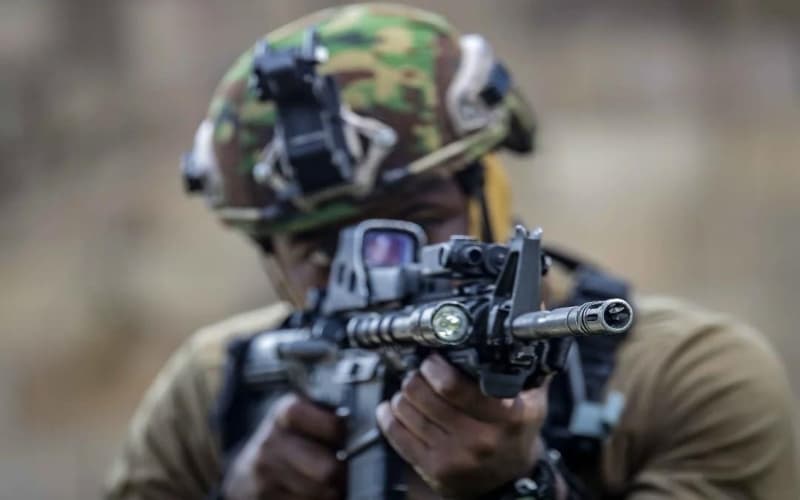We're loading the full news article for you. This includes the article content, images, author information, and related articles.
The newly established Gang Suppression Force (GSF) in Haiti has refuted social media claims of a Kenyan officer's death, confirming all personnel are accounted for after a significant operation against the Gran-Griff gang in the Artibonite Department.

The Gang Suppression Force (GSF) in Haiti has dismissed as false and misleading recent social media reports alleging the death of a Kenyan officer during an operation. In a statement released on Monday, October 20, 2025, the GSF confirmed that all its personnel, including Kenyan officers, are safe and accounted for.
The clarification follows a major joint operation conducted on Friday, October 17, 2025, from 6:30 AM to 10:00 PM EAT, involving the GSF, the Haitian National Police (PNH), and the Haitian Armed Forces (FAD’H). The primary objective was to clear the Petite-Rivière–Liancourt–Pont Sondé route in the Artibonite Department, a critical transport corridor that had been blocked by gang activities.
During the operation, security forces encountered significant resistance from the Gran-Griff gang, one of the largest and most powerful gangs in Haiti's Artibonite Department. The gang attempted to fortify its positions by digging trenches and occupying tall buildings, using Molotov cocktails against the advancing forces. However, specialised units from the GSF and PNH successfully neutralised these threats, securing the area.
The joint forces successfully cleared several barricades and facilitated the safe delivery of armoured vehicles to police stations in Pont Sondé, Petite-Rivière, and Liancourt, aiming to bolster the security presence in the region. The GSF expressed gratitude to local residents for their cooperation during the mission.
Kenya's involvement in Haiti's security crisis began with a pledge in July 2023 to deploy 1,000 police officers to the Caribbean nation. This commitment was in response to a request for international assistance from then-Haitian Prime Minister Ariel Henry, aimed at curbing escalating gang violence that has plagued the country since 2018. The United Nations Security Council approved the Multinational Security Support (MSS) mission, led by Kenya, in October 2023.
The security situation in Haiti has been dire, with gangs controlling an estimated 80% of the capital, Port-au-Prince, and violence spreading to other parts of the country. The MSS mission, which saw its first contingent of Kenyan police officers arrive in Haiti on June 25, 2024, faced initial delays and legal challenges in Kenya. The mission's mandate transitioned into the Gang Suppression Force (GSF) on September 30, 2025, following UN Security Council Resolution 2793 (2025).
The GSF operates under a strengthened mandate, allowing it to conduct intelligence-led, targeted counter-gang operations independently or jointly with the Haitian National Police and the Haitian Armed Forces. This expanded mandate includes the authority to arrest and detain suspected gang members in accordance with international law and human rights standards. The force is also tasked with protecting critical infrastructure, such as airports, ports, hospitals, and schools, and ensuring unhindered humanitarian access.
The mission involves personnel from several countries, including Kenya, Jamaica, the Bahamas, Bangladesh, Barbados, Benin, and Chad. The United States has been a significant supporter, providing financial and logistical aid, including the recent delivery of 20 new Armoured Personnel Carriers (APCs) to the GSF. Five of these vehicles have already been deployed in the Artibonite area.
The mission continues to face significant challenges, including persistent gang violence and concerns about the adequacy of equipment. The transition from MSS to GSF aims to address some of these issues by providing a more robust mandate and increased capacity. However, the effectiveness of the GSF in stabilising Haiti and paving the way for elections remains a key concern.
While the GSF has a strengthened mandate, questions remain regarding its consistent funding sources beyond voluntary contributions and the specific recruitment process for its members, as the force is still in its formative stages. The long-term timeline for the mission also remains uncertain, with some observers noting that similar peacekeeping efforts in other countries have extended for many years.
Observers will be closely watching the GSF's ability to sustain its operations against powerful gangs, particularly in areas outside Port-au-Prince. The impact of the newly delivered armoured vehicles and the expanded mandate on the overall security situation will be critical. Further, the progress towards establishing conditions conducive to free and fair elections in Haiti by February 2026, as envisioned by the mission, will be a key indicator of success.
Keep the conversation in one place—threads here stay linked to the story and in the forums.
Sign in to start a discussion
Start a conversation about this story and keep it linked here.
Other hot threads
E-sports and Gaming Community in Kenya
Active 9 months ago
The Role of Technology in Modern Agriculture (AgriTech)
Active 9 months ago
Popular Recreational Activities Across Counties
Active 9 months ago
Investing in Youth Sports Development Programs
Active 9 months ago